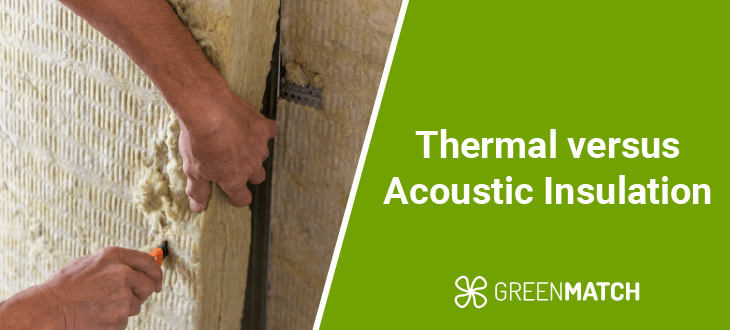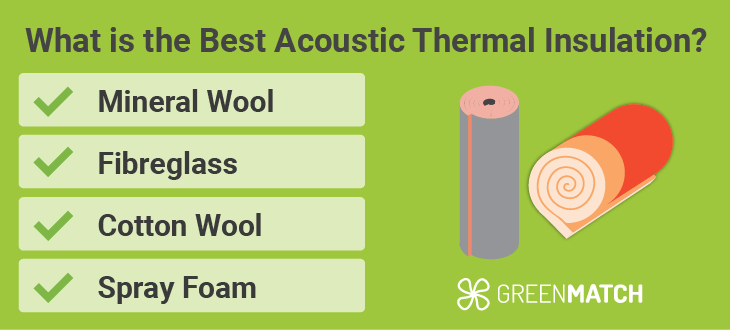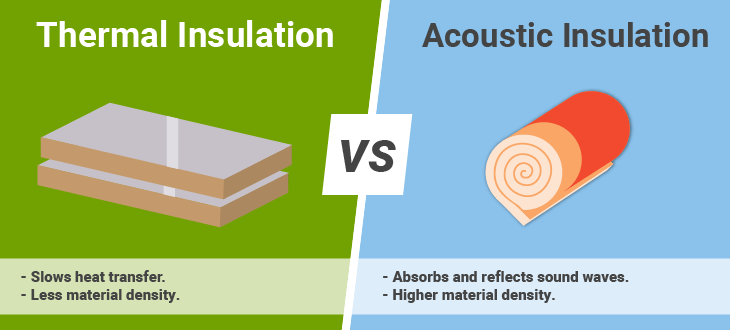Answer these simple questions and we will find you the BEST prices
Which type of solar quotes do you need?
It only takes 30 seconds
100% free with no obligation

Get Free quotes from insulation specialists near you

Save money by comparing quotes and choosing the most competitive offer

The service is 100% free and with no obligation
- GreenMatch
- Insulation
- Thermal Acoustic Insulation
Thermal and Acoustic Insulation: Benefits, Best Types, Costs


- Thermal insulation is used for heat retention, whereas acoustic insulation is used to block sound transfer.
- Some acoustic insulation materials may have thermal properties, but they will fall short of thermal insulation materials in terms of effectiveness.
- Some of the most popular thermal acoustic insulation materials are mineral wool, fibreglass and cotton wool.
There are typically two main types of insulation materials found on the market: thermal insulation and acoustic insulation. As the names suggest, both serve a very different purpose.
Thermal insulation materials are used to help homes retain heat, whereas acoustic insulation materials are used to absorb or block sound. Some may assume thermal insulation would have acoustic properties and vice versa, but this is not often the case. But you may be wondering, does acoustic insulation have thermal properties?
This ultimate GreenMatch UK guide will break down everything you need to know about thermal and acoustic insulation materials, their purposes, the best materials, and installation procedures.
Ready for some home insulation? Let GreenMatch UK handle the hard work for you. Instead of spending countless hours researching and vetting installers, spend just 30 seconds on our online form and receive up to 3 free home-tailored quotes in return. No charges or obligations apply. Click the button below to begin!
- Describe your needs
- Get free quotes
- Choose the best offer
It only takes 30 seconds



What is thermal acoustic insulation?
Thermal acoustic insulation is a multifunctional material that can both slow down heat transfer and block sound transmission. However, on the insulation market, you’re far more likely to find materials that are optimised for one or the other purpose.
- Thermal insulation: This group of insulation materials is optimised to slow down heat transfer into, and out of your property. That way, they help your house stay warm in winter and cool in summer. Aim for low U-value insulation as these materials are best at resisting heat transfer.
- Acoustic insulation: These insulation materials are more optimised to absorb and block sound transfer, thus reducing noise pollution in your home.
While there are not many materials that can effectively block both heat and sound, some noise insulation materials do have slight thermal properties, and vice versa.
The best way to handle both home requirements is to use a combination of thermal and acoustic insulation measures throughout your home.
What is the best acoustic thermal insulation?

While there isn't a single best thermal and acoustic insulation material, there are several options on the market that are worth considering. The best insulation material for you will hinge on factors such as your budget, home type, and personal needs.
Some acoustic insulation materials will indeed have thermal properties to some degree, though they may not be as effective as thermal insulation. Nevertheless, here are some popular contenders:
- Mineral wool: Made from rock or glass, this highly popular thermal insulator is budget-friendly, effective, and easy to install. Costing around £13 - £17.5 per m2, mineral wool can provide relatively effective acoustic insulation in higher densities. This is especially true if your mineral wool exceeds a density of 45kg/m3.
- Fibreglass: Similar to mineral wool, high-density fibreglass can provide a decent balance of thermal and acoustic insulation at the same time, able to absorb excess noise relatively well. Fibreglass normally costs around £10 per m2, making it one of the most affordable options for thermal acoustic insulation.
- Cotton wool: Whilst harder to come by, cotton wool is a handy acoustic insulator with pretty impressive thermal properties. A California State Science Fair study concluded that cotton was one of the best materials for noise cancellation. Costing around £10 - £14 per m2, high-density cotton also has relatively good thermal properties.
- Spray foam: Better known as a thermal insulator, polyurethane spray foam insulation is an airtight expanding foam that has some acoustic insulation properties, especially for higher frequencies. Costing a higher £21.5 per m2 or more, spray foam is unfortunately not the most sustainable material in comparison. It’s a very popular option, especially for loft and cavity wall insulation.
While these materials may exhibit a mix of both thermal and acoustic insulation properties, they are often tailored to serve one purpose better than the other. This is often seen in the material density. Higher-density materials are usually better acoustic insulators.
What is the difference between thermal and acoustic insulation?

It’s more common to come across materials that are tailored exclusively for thermal insulation or acoustic insulation, rather than a mix of both. This is due to the innovative tricks that make each material successful at its purpose.
As the name suggests, thermal insulation is optimised for slowing heat transfer, whereas acoustic insulation is optimised for absorbing sound waves.
Another key difference is material density. Acoustic insulation materials tend to have far higher densities to successfully absorb or reflect heat. Some soundproof insulation like mass-loaded vinyl (MLV) are so dense, that they don’t absorb sound but directly reflect it.
Is thermal insulation good for soundproofing?
Contrary to popular belief, thermal insulation is not good for soundproofing. While some materials may provide a little bit of noise insulation, it would be incorrect to suggest they are effective in doing so.
While using acoustic insulation will generally improve your home's thermal insulation by a small margin, it would not be enough to truly enjoy the big energy bill savings, carbon footprint cuts, and home comfort that come with high-quality thermal insulation.
Likewise, while thermal insulation may provide some sound dampening to your home, it won’t be enough to truly create a peaceful quiet indoor environment.
How much does thermal acoustic insulation cost?
Thermal acoustic insulation material costs vary depending on your chosen material density, how much of it you need, and several other factors.
Here is a cost breakdown of some of the most common thermal acoustic insulation materials:
| Material | Cost per m2 |
|---|---|
| Mineral wool | £13 - £17.5 |
| Fibreglass | £10 |
| Cotton wool | £10 - £14 |
| Spray foam | £21.5 |
While these materials provide a mix of both properties, choosing materials tailored specifically for thermal insulation or acoustic insulation will give you the best results. Aim to balance a mix of both measures in your home for the best results.
DIY installation vs professional installation
Obtaining thermal acoustic insulation materials is just the beginning of the road. It’s just as important to have a professional installation in place to avoid unnecessary repair work and mounting costs.
Some thermal and acoustic insulation measures can be done DIY, at varying difficulties, but it’s always suggested to work with a professional installer. That way, you can ensure you receive quality workmanship and a home solution that will last you decades to come.
Unfortunately, finding the perfect installer at a feasible price is no small task. Prospective customers often find themselves spending endless hours scouring websites and arranging phone calls with installers. Luckily, GreenMatch UK can free you from this burden.
Through our services, you can receive up to 3 free home-tailored quotes straight from our nationwide network of accredited installers. The best part? Our services are completely free and with no obligations to accept quotes. Just fill out our 30-second intake form and let the bargains come to you. Click the button below to begin!
- Describe your needs
- Get free quotes
- Choose the best offer
It only takes 30 seconds



FAQ
Thermal acoustic insulation materials can provide heat retention capabilities whilst also reducing sound pollution. However, not many materials can perform both tasks effectively and it’s best to work with materials that are exclusively tailored to each purpose.
The best acoustic thermal insulation will depend on factors such as your budget, needs, and personal preferences. Generally speaking, mineral wool and fibreglass are the most affordable, yet effective in terms of providing both thermal and slight acoustic insulation. However, such materials are not renowned for their soundproofing.
Contrary to popular belief, thermal insulation is not good for soundproofing. This is usually due to the lower material density of thermal insulation. For the best results, work with high-density acoustic insulation materials that are tailored for purpose, such as mass-loaded vinyl (MLV).
Generally speaking, acoustic insulation does not have any effective thermal properties. Proper acoustic insulation may indeed provide a small degree of thermal insulation, but for effective heat retention, it’s best to work with materials tailored to that purpose.
Thermal insulation costs vary depending on your home size, type of insulation material, part of the home you are insulating, and preferences amongst many other factors. It is not possible to provide an overarching price average. For an accurate understanding, it’s best to consult a professional installer via GreenMatch UK for a retrofit assessment.

Akif is a copywriter at GreenMatch since 2023. With a keen interest in community sustainability, green solutions and the role of digital media in identifying climate trends, he aims to hone in on his background in International Studies and Digital Media to provide a multidisciplinary approach to written content rooted in credible research and accuracy.
We strive to connect our customers with the right product and supplier. Would you like to be part of GreenMatch?

